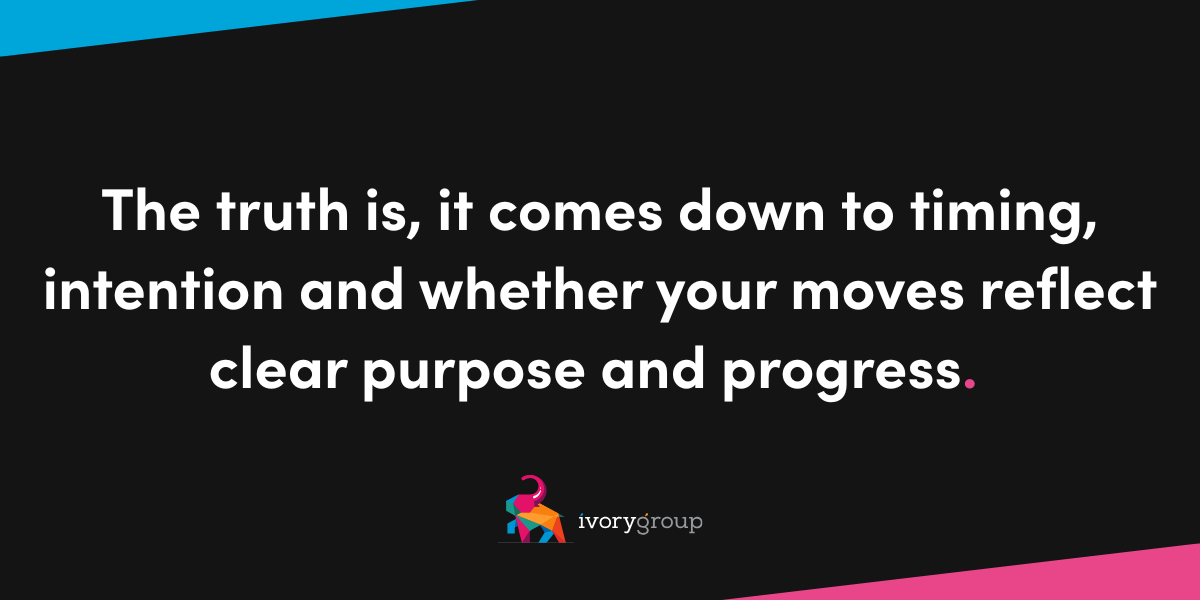
Job Hopping: When Is It Smart and When Is It Jeopardising Your Career?
Changing jobs regularly was once considered a career misstep. Today, it's not the number of moves that matters; it’s the why behind them and how your experience supports your professional growth.
Across the built environment and beyond, job hopping has become more common. But is job hopping a smart way to grow your career, or could it signal instability that ends up holding you back? The truth is, there is no one-size-fits-all answer. It comes down to timing, intention, and whether your moves reflect clear purpose and progress.
This blog explores when job hopping works in your favour, when it starts to raise concerns with recruiters and hiring managers, and how to confidently frame your experience.
What Does Job Hopping Mean Today?
Job hopping used to mean moving roles every one to two years, often without a clear reason. Job hopping was often perceived as a lack of loyalty or commitment. But the way careers evolve has shifted.
In sectors like construction, engineering, architecture and government, shorter tenures are to be expected, driven by project work, contract-based roles, or structural changes. In construction, the job turnover rate remains above the national average at 8.6% reflecting the sector’s project-based nature and ongoing workforce churn.
What was once labelled as career hopping is now seen as adaptability. Still, hiring managers may question whether you can commit.
Ultimately, it’s less about how many times you’ve moved and more about why you moved and what each step added to your career story.

The Smart Side of Job Hopping
There are many valid reasons to change jobs. In some cases, staying too long can limit your growth. If you’ve hit a ceiling, consistently outperformed your role, or tried to create change without success, it may be time to consider your options.
We often hear candidates consider a move when:
- The company’s direction no longer aligns with your values
- The role lacks long-term potential or challenge
- Their development needs are no longer being supported
- They’ve attempted to improve things internally
- They’re looking for progression or a meaningful career change that their current role can’t provide
A well-timed job jump can position you closer to your long-term goals, especially when the next opportunity offers meaningful growth. When handled with thought and self-awareness, these moves reflect ambition. They show you’re proactive about your career and unwilling to settle when a role no longer supports your goals.
When Job Hopping Could Be Jeopardising Your Career
Without clear reasons, frequent job hopping can raise red flags.
Hiring managers look for patterns: short tenures in permanent roles, unexplained gaps, or no progression. Your CV is your career story. If it reflects instability, you may be seen as a job hopper rather than a growing professional.
Some hiring managers still hesitate when they see a CV that looks like a classic job hopper, especially when the roles are not contract-based. These patterns can affect your chances of being shortlisted. They may also impact salary negotiations, especially if employers are concerned about turnover risk.
So how often should you job hop? The answer depends on your career goals, the type of roles you’re applying for, and how well your employment history reflects your intention and progress.
Contract Roles and Job Hopping Are Not The Same
In the built environment, project-based work and contract roles are a natural part of the employment landscape.
When presented correctly, these are not considered job hopping and can help you stand out. Short-term contract roles can demonstrate your adaptability and project delivery skills. Remember, a job interview is an opportunity to show hiring managers and potential employers that you completed your work and moved on for the right reasons.
To distinguish contract work:
- Mark each position as contract, fixed-term or project-based
- Include the contract duration and a summary of the assignment
- Where appropriate, group multiple contracts under one employer

How To Talk about Job Changes in Interviews
How you explain your career decisions can be just as important as the decisions themselves.
To answer confidently:
- Be upfront about why you left each role
- Share what you learned and how it helped shape your next step
- Avoid criticising former employers or colleagues
- Focus on why the role you’re applying for aligns better with your goals
Hiring managers and potential employers understand that not every move is perfect. What they value is your ability to make considered decisions and communicate them. If your path has been unconventional, own it. Show that you’ve thought it through and that your next step is about direction, not escape.
It’s Not Job Hopping, If It’s Going Somewhere
A successful career doesn’t need to follow a predefined plan. Some professionals grow within one company, while others progress by exploring new opportunities. Both paths are acceptable when they’re intentional.
If you’ve changed jobs frequently, ask yourself: Are your moves building toward something meaningful, or are they quick escapes from short-term frustrations? Are you progressing or just moving?
Whether you’re ready for a career change or reconsidering your next move, make sure your next move supports your long-term goals.
And if you’re not sure where to go from here, you don’t need to figure it out alone. At Ivory Group, we help candidates assess their options with clarity, purpose and insight into the industries we know best.
Your next move should do more than just get you through the door. It should take you further in your career.
Need guidance on finding your next role?
At Ivory Group our expert consultants are here to guide you.
Ivory Group specialises in recruiting those who strive for success when working in built environments. We support the engineering, architecture, construction and government sectors with determination, tenacity, and a bit of grit.
We provide expert consultation at every stage of the process, from CVs to interviews and negotiating offers. We guide candidates to find roles where they not only succeed professionally but also find fulfilment and purpose.
Contact us today to learn how Ivory Group can help you find your natural habitat.
SHARE






